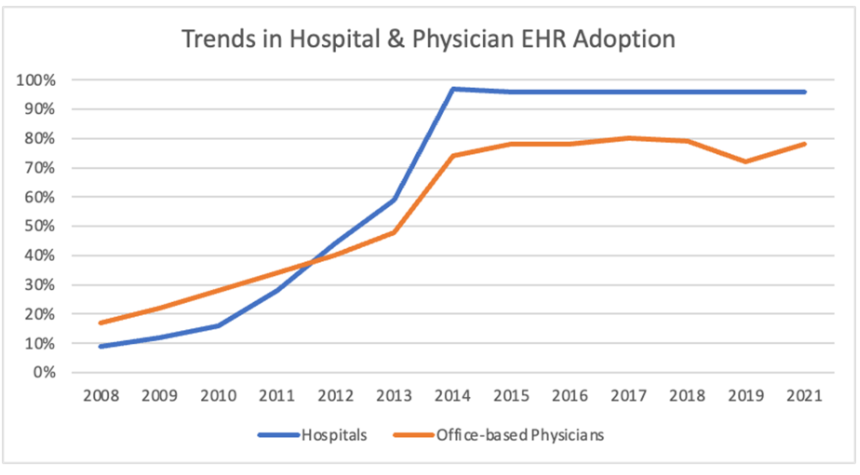By Seth Pazinski, Peter Karras, and Kim Lundberg, ONC
Twitter: @ONC_HealthIT
A new ONC report to Congress updating progress on the access, exchange, and use of electronic health information (EHI) is now available.
Hundreds of thousands of physician offices, hospitals, and health systems across the U.S. have transitioned from paper-based medical records to health IT that is certified under the ONC Health IT Certification Program. This report highlights the impact that the 21st Century Cures Act (Cures Act) and its implementation contributed to continued progress toward interoperable access, exchange, and use of EHI.
Recent updates from HHS and ONC demonstrate the impact that Cures Act implementation has had on our nation’s health IT infrastructure.
- Network Interoperability: HHS recognized the first set of applicant organizations approved for onboarding as Qualified Health Information Networks under the Trusted Exchange Framework and Common Agreement (TEFCA). Collectively, the QHIN applicants have networks that cover most U.S. hospitals, tens of thousands of providers, and process billions of annual transactions across all fifty states.
- Standardized APIs: Certified health IT developers are offering products that meet the ONC Cures Act Final Rule requirements; this includes making secure, standardized application programming interfaces (APIs) available for business-to-business and business-to-consumer exchange.
- Standardized Data: Certified health IT developers have incorporated United States Core Data for Interoperability (USCDI) data elements in their products and ONC kicked off another annual round of United States Core for Data Interoperability version updates, proposing to add 20 data elements and one new data class (Facility Information) to the standardized set of health data classes and data elements that serve as a baseline for health information exchange and inform interoperable health IT implementations.
The report also highlights progress toward implementing the 2020-2025 Federal Health IT Strategic Plan, developed with input from over 25 federal agencies. The report describes federal government and private sector progress toward building a nationwide infrastructure for the access, exchange, and use of EHI, identifies barriers to such a nationwide infrastructure, and includes the following recommendations to improve the use of health IT:
- Support “health equity by design” to include equitable access to information and communications technology, and improve health outcomes by building equity into the design of health IT.
- Coordinate with the Centers for Disease Control and Prevention and other HHS agencies so that federal and state, tribal, local, and territorial public health data systems are modernized using health IT standards that enable the collection, access, exchange, use, and reporting of public health data to prevent and mitigate public health threats.
- Promote the appropriate sharing of information by educating patients and the care community about information blocking policy and regulations, track information blocking complaints, and coordinate with the HHS Office of Inspector General and other HHS components on information blocking enforcement.
- Implement TEFCA to create a nationwide policy and technical infrastructure approach to better enable information sharing across health information networks.
- Advance standards to support health information sharing across all care settings, including APIs and USCDI, via certified health IT systems.
- Coordinate with federal agencies to ensure ONC-adopted standards support EHI access, exchange, and use across federal programs and health IT systems.
HHS thanks Congress for the vision, passage of, and continued commitment to the Cures Act. ONC will continue to work with our federal and private sector partners to improve the use of health IT to promote health and wellness, enhance the delivery and experience of care, and build a secure, data-driven ecosystem to accelerate research and innovation.
This post was originally published on the Health IT Buzz and is syndicated here with permission.

